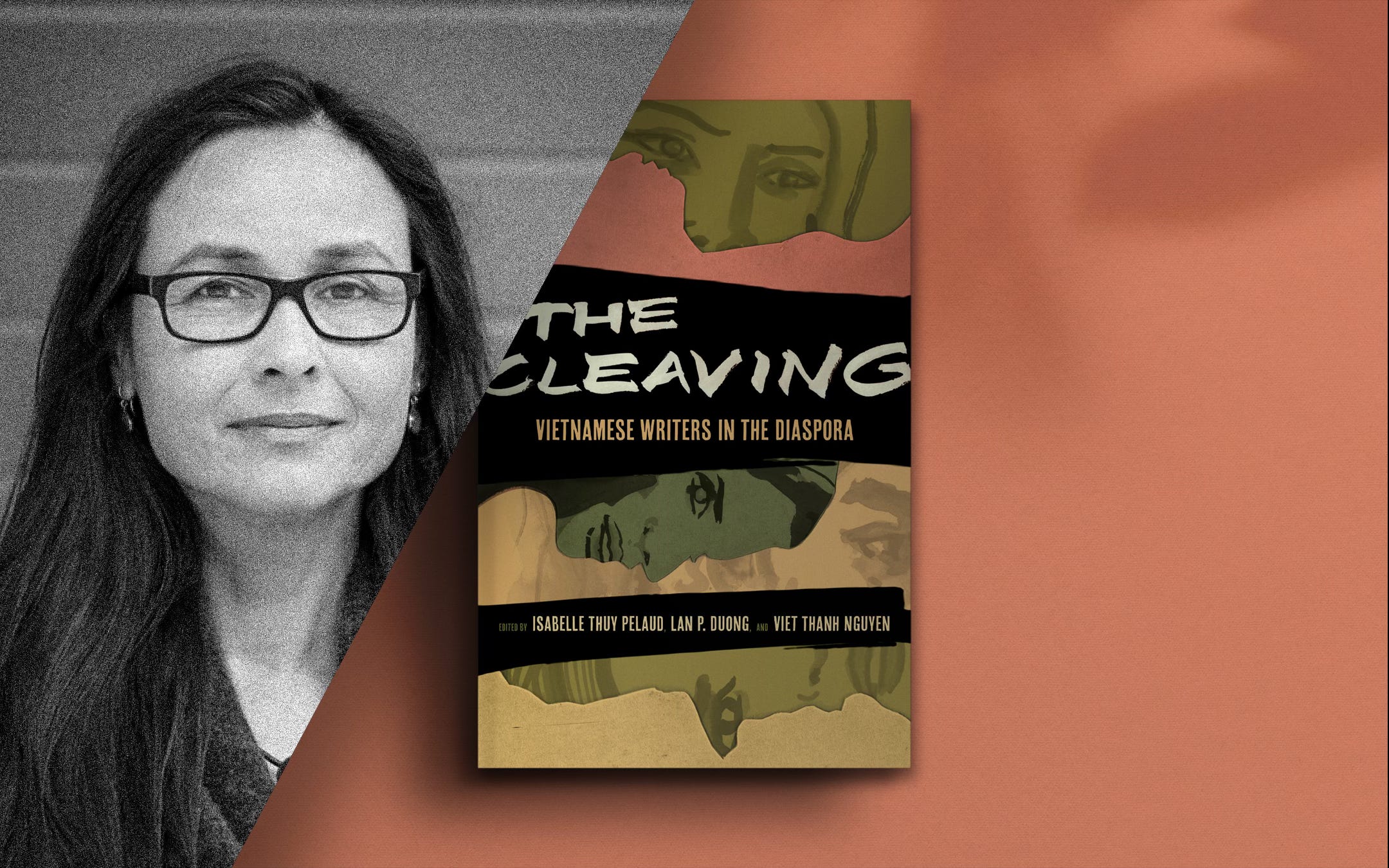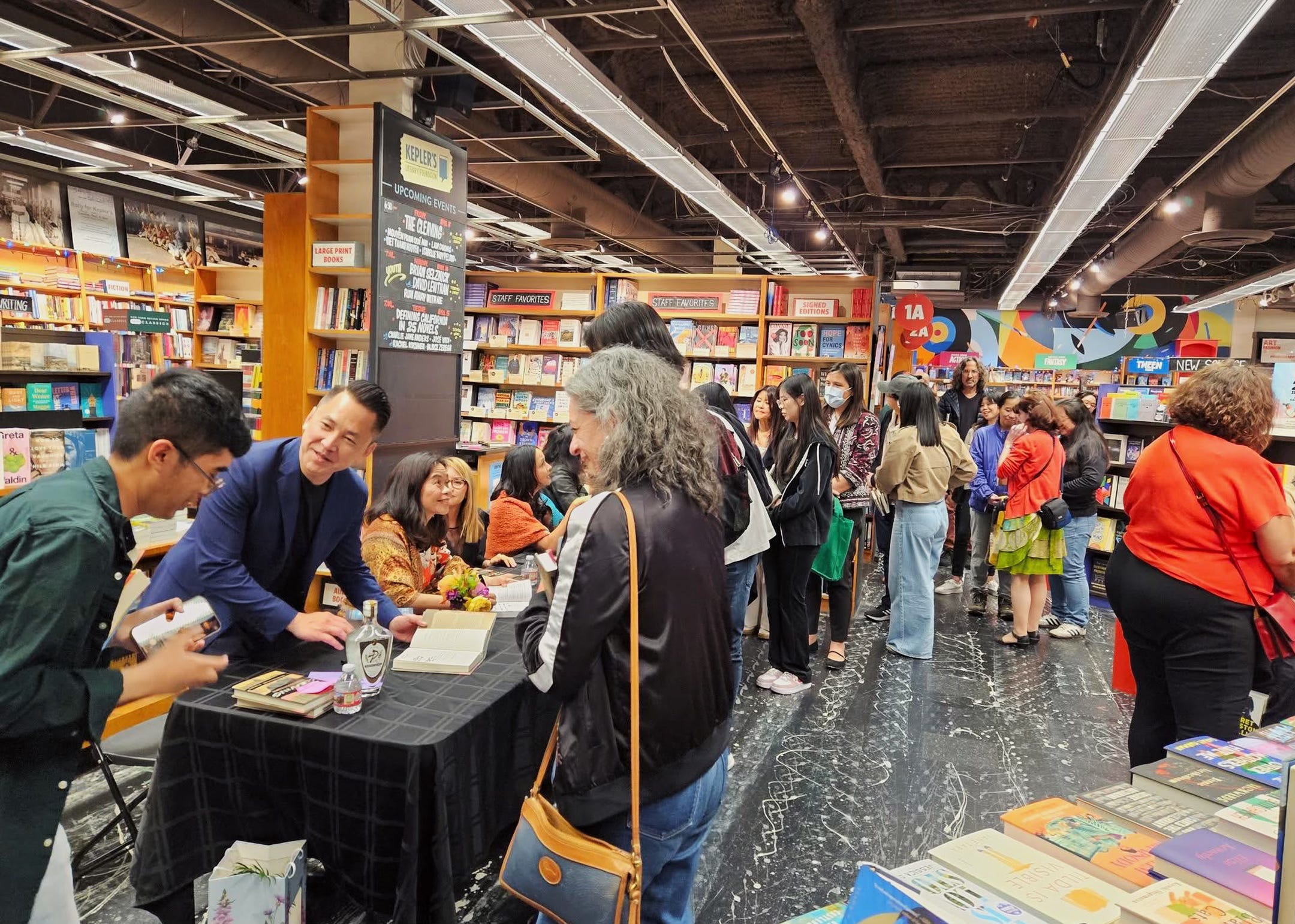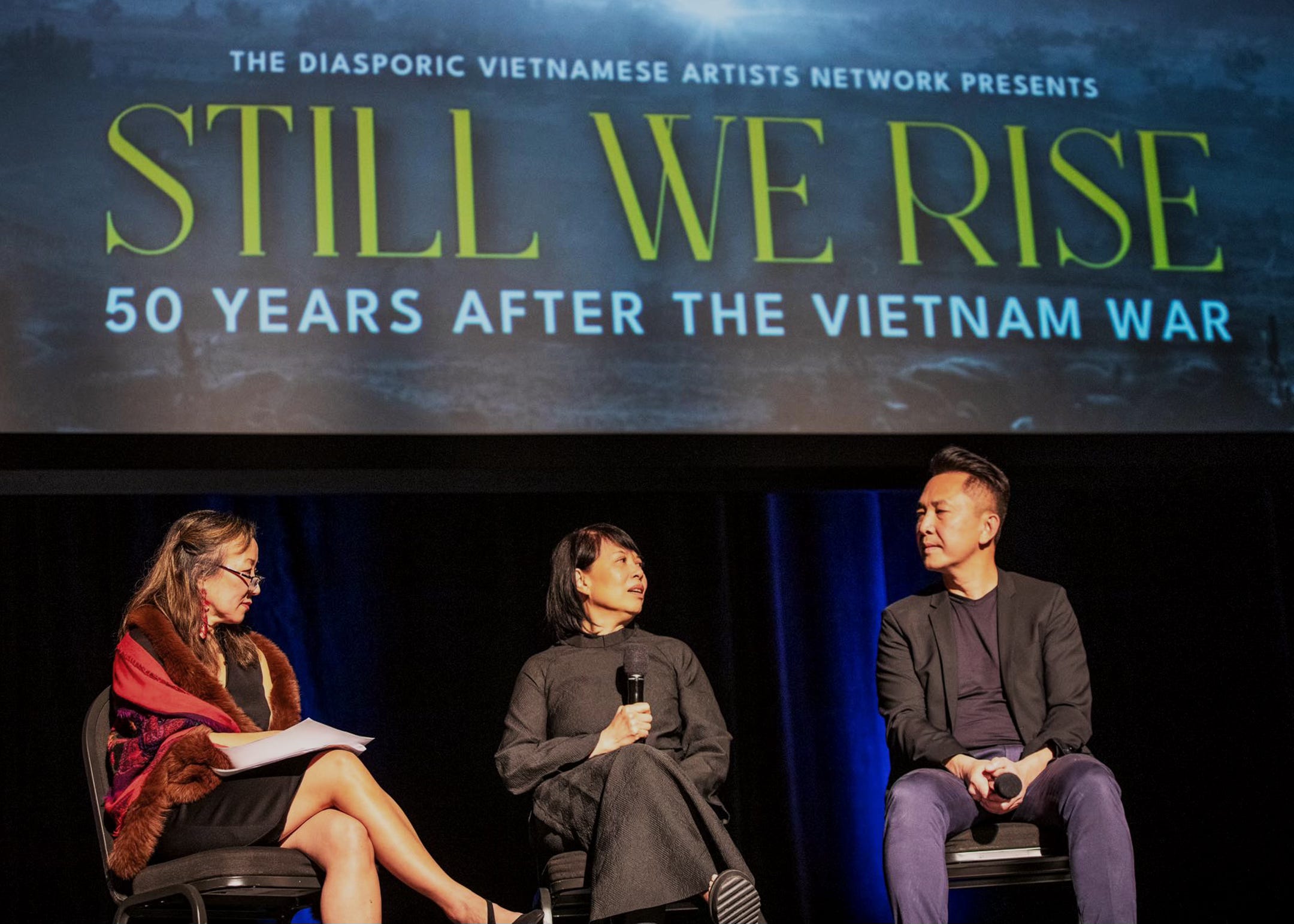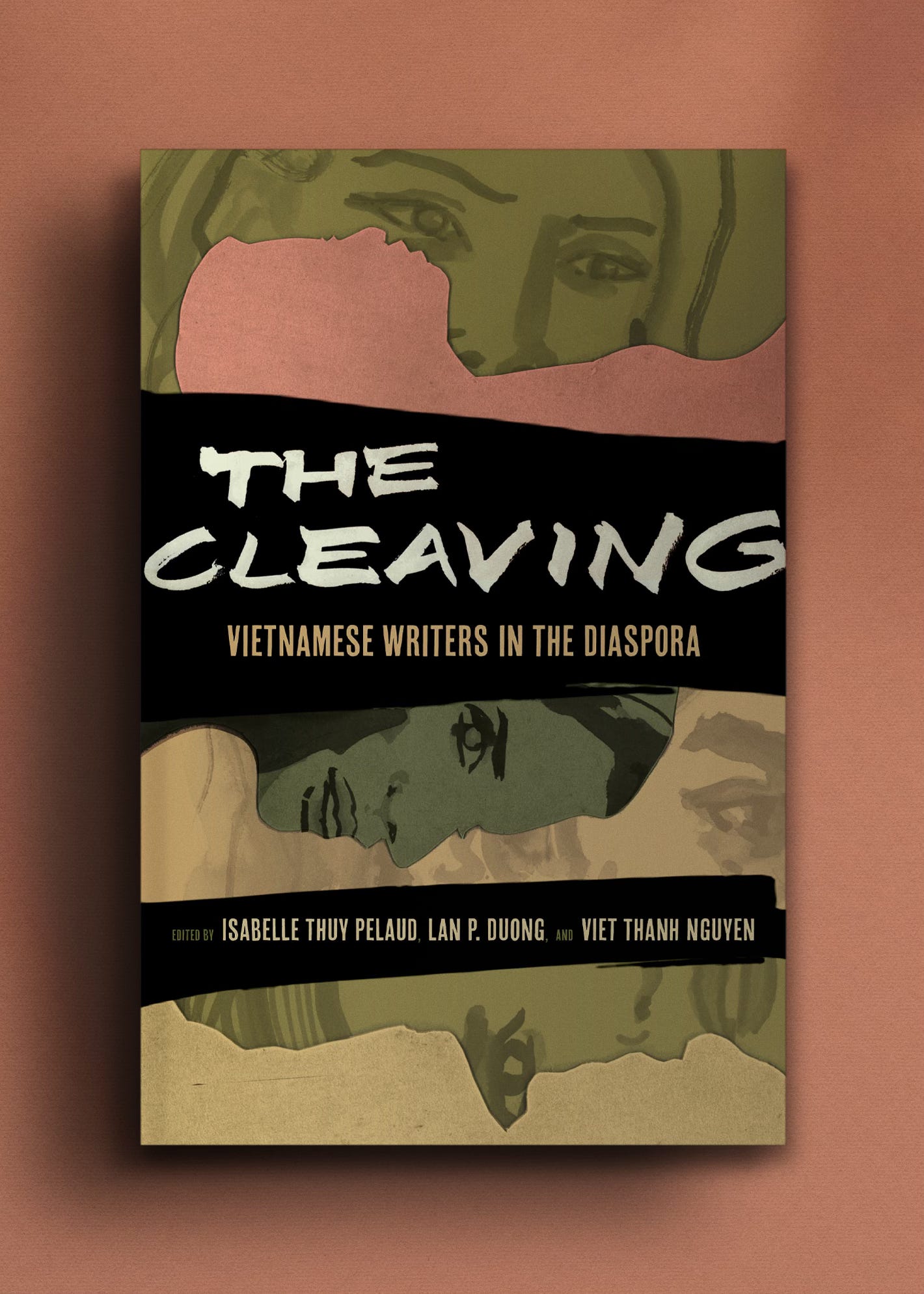The Cleaving: Vietnamese Writers in the Diaspora with Isabelle Pelaud
Isabelle Pelaud introduces a unique literary project
Fifty years after the end of a ruinous war a new generation of confident and assertive Vietnamese writers are reclaiming their histories.
In The Cleaving, a compilation of dialogues between Vietnamese diaspora writers, ideas like trauma, displacement, memory and belonging are investigated.
Uniting these dialogues, as the editor Isabelle Pelaud explains in this interview, is a determination to challenge lazy narratives and to bring to the centre an authentic, inspiring voice.
Unseen Histories
The Cleaving is an intriguing book, structured around eighteen dialogues between writers. Can you tell us a little about its genesis and purpose?
Isabelle Pelaud
The genesis of this project came in San Francisco, when in early 2018, a Diasporic Vietnamese Artists Network (DVAN) organiser Anh Thang Dao-Shah and I (co-founder of DVAN) shared a home-cooked meal and brainstormed how to uplift diasporic Vietnamese writers.
Inspired by writers’ dialogues in a literary magazine. Thang proposed collecting conversations during a writers’ residency. I responded enthusiastically, emphasising the importance of authors’ own reflections on their work.
Our shared vision was tested at the first DVAN Vietnamese writers retreat at the Djerassi Resident Artists Program that year. Although Thang later stepped away, her role was foundational. The five dialogues we collected at Djerassi were so rich that Lan Duong, Viet Thanh Nguyen and I decided to include more writers and publish them. We volunteered our time as editors.
The purpose of this anthology was to illuminate the lived experiences, diversity, and complexities of refugees and immigrants of colour, especially in an era of rising anti-immigrant sentiment. My co-editors and I believe that Diasporic Vietnamese literature is shaped by geopolitical histories, marked by colonialism, war, and race.
By bringing Vietnamese writers into dialogue across borders, we wanted to explore the impact these forces have on what they write. We also wanted to see what new insights would emerge during this exchange.
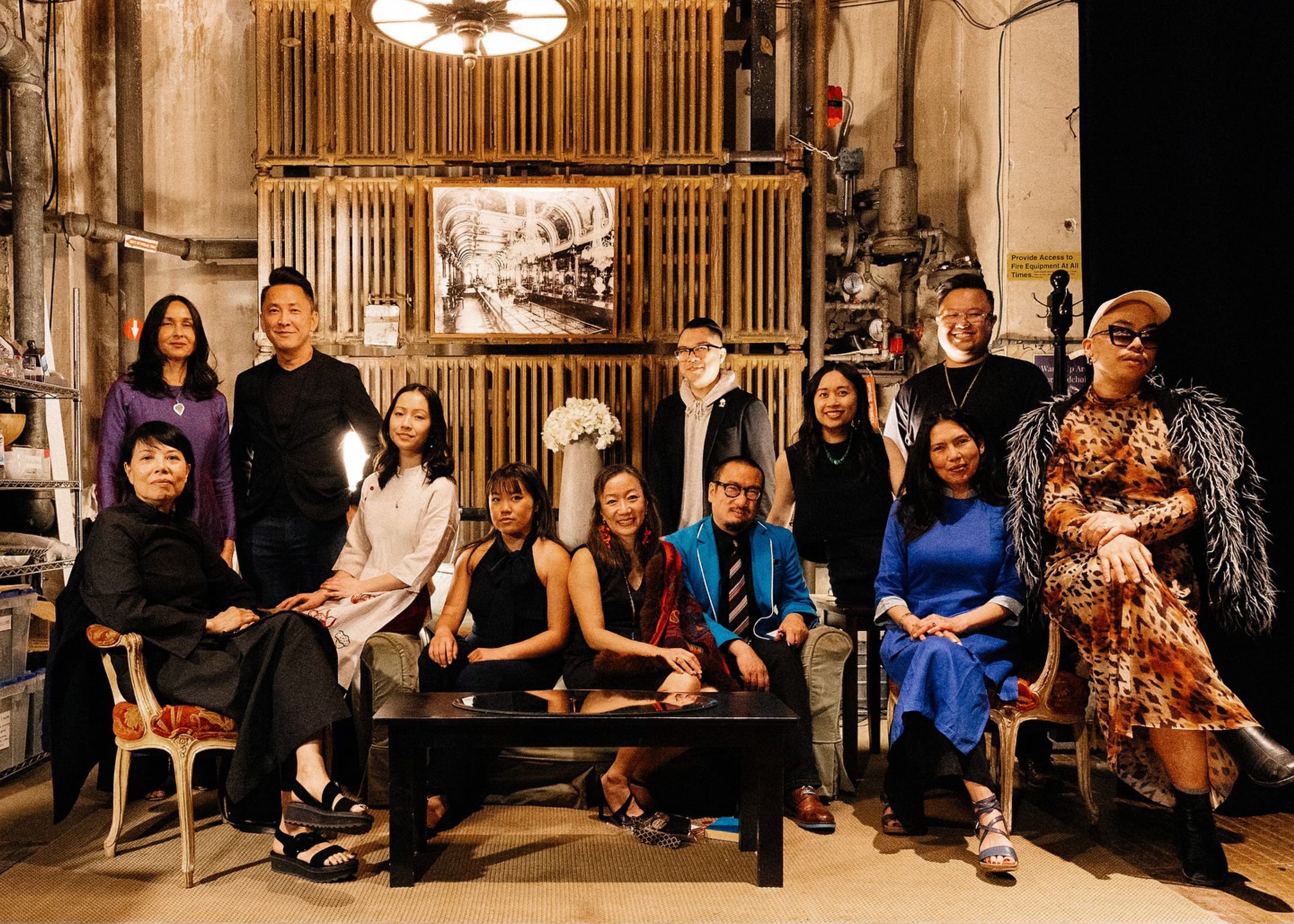
Unseen Histories
You remind readers very early on that Việt Nam is ‘a country not a war’. What themes appeared in The Cleaving as writers discussed the impact of conflict on their work?
Isabelle Pelaud
In The Cleaving, themes of conflict emerge not just through war, but through the layered tensions of identity, representation, and belonging. Writers reflected on how being racialised in Western countries—as war refugees or colonial subjects—shapes both their artistic expression and public reception.
Many express ambivalence toward the publishing industry, where market expectations often flatten their complex identities into simplistic narratives. Women and queer writers, in particular, articulated struggles between creative freedom and cultural or familial expectations.
The dialogues reveal a deep awareness of how external perceptions and internalised doubts can influence one’s creative process. Themes of violence, authorship, feminism, language, and form surface repeatedly, highlighting how writing itself becomes a space to challenge erasure and assert presence.
The Cleaving ultimately captures how these writers navigate the weight of inherited histories and the stereotypes that ensued, while also carving out space for new narratives—ones rooted in their lived realities and imagination, rather than imposed images.
Unseen Histories
When Heaven and Earth Changed Places by Lê Lý Hayslip (1989) was a perspective-shifting book that presented a new view of that war. Was this book an outlier or did it change publishing for Vietnamese writers?
Isabelle Pelaud
When Heaven and Earth Changed Places by Lê Lý Hayslip was a groundbreaking work, offering a rare perspective from a former communist and a woman caught between both sides of the Vietnam War. It remains the only Vietnamese American memoir adapted into a Hollywood film, directed by Oliver Stone.
However, the film's release sparked protests from Vietnamese Americans, many of whom fled South Vietnam and viewed the portrayal as one-sided.
Most memoirs from this community come from refugees who escaped communism, highlighting how unusual Hayslip’s story was. At the time, American publishing and academia tended to give more attention to Northern Vietnamese perspectives, perhaps because they were more respected for having been able to defeat Americans as well as the fact that academics tended to be against the war.
In contrast, South Vietnamese voices were marginalised. They were viewed as reminders of loss and failure, as well as a source of guilt for having been abandoned by their American allies. While Hayslip’s memoir was not part of a broader publishing trend, its visibility may have cracked open space for other Vietnamese American stories.
Unseen Histories
One of your interlocutors makes an interesting point about language. In Vietnamese there are no past or future tenses. ‘Our time is circular’. How does that shape writing about events gone by?
Isabelle Pelaud
The idea that 'our time is circular' in Vietnamese—a language without past or future tenses— can influence how diasporic Vietnamese writers approach memory, trauma, and history.
Rather than placing events neatly in a linear timeline, their writing can indeed reflect a cyclical, layered understanding of time, where the past continuously informs the present. This temporal fluidity appears in narrative structures that fragment, loop, or shift unexpectedly, as seen in the works of Ocean Vuong and Kim Thúy. Their writing resists the linear expectations of Western literary forms, embodying a different relationship to time and memory.
This difference is not just linguistic but is also political—challenging dominant narratives that privilege singular truths or tidy conclusions. For Vietnamese diasporic writers, grappling with language means navigating both literal and cultural translation, and in doing so, they expose how dominant definitions of 'literariness' are shaped by power.
Their work asks us to rethink how we read, remember, and define writing itself. Not all Vietnamese American writers, I need to remind readers, speak Vietnamese.
Unseen Histories
The Second Indochina War (1955 – 1975) obviously smothers many people’s understanding of Vietnamese history. For readers wanting to gain a richer knowledge about the country’s past, are there any books or collections that you would recommend?
Isabelle Pelaud
Writers are writers. They are neither historians, nor social documentarists. Like all writers, they use their imaginaries, research and experience to write. They cannot be expected to represent their communities.
Having said that, there are many good books by Vietnamese American writers that powerfully challenge dominant narratives shaped by Hollywood and American war memoirs. Too often, Vietnamese people have been portrayed as voiceless figures—background to stories centred on American soldiers.
In contrast, works by Vietnamese and diasporic writers show the complexities of Vietnamese history, emotions, and perspectives.
I recommend for example to read When Heaven and Earth Changed Places by Lê Lý Hayslip, The Sacred Willow by Dương Văn Mai Elliott, South Wind Changing by Jade Ngov Quang Huynh, No Passenger on the River by Tran Van Dinh. The graphic novels Vietnamerica by GB Tran and The Best We Could Do by Thi Bui
As well as this, of course, there are the novels The Sympathizer by Viet Thanh Nguyen and The Mountains Sing and Dust Child by Nguyễn Phan Quế Mai.
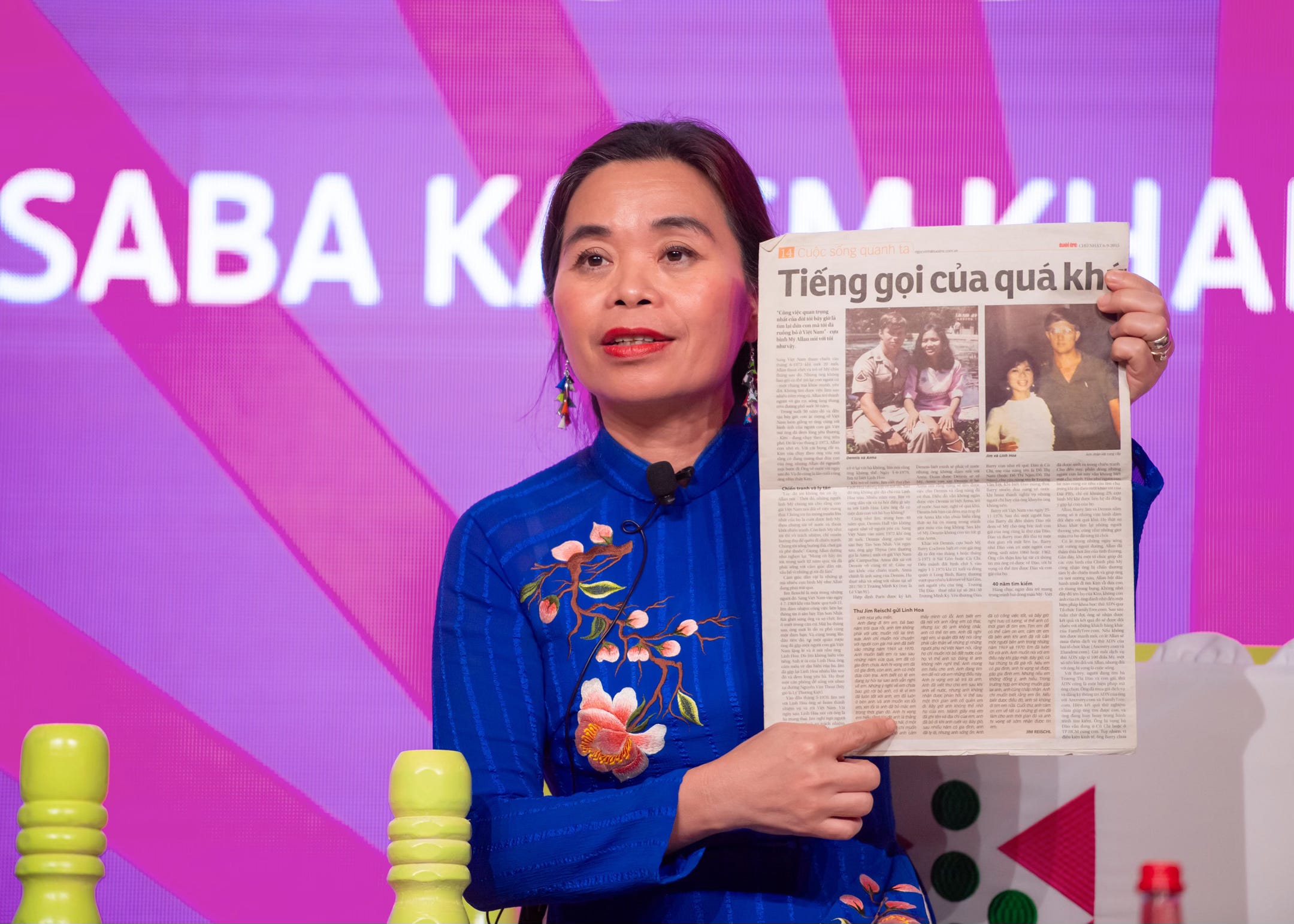
Unseen Histories
You note a strange cross current. While intolerance is rising generally across the United States, Vietnamese writers are enjoying recognition and are moving ‘hearts and minds’. Could you tell us about some of the most exciting new voices?
Isabelle Pelaud
Recognition is never for writers of colour in the West especially, just about talent—as cultural and institutional barriers limit which books get written, published, and promoted. Still, new original and talented voices are breaking through here and abroad (listed here are some that were either translated in English or written in English and available in the U.S.).
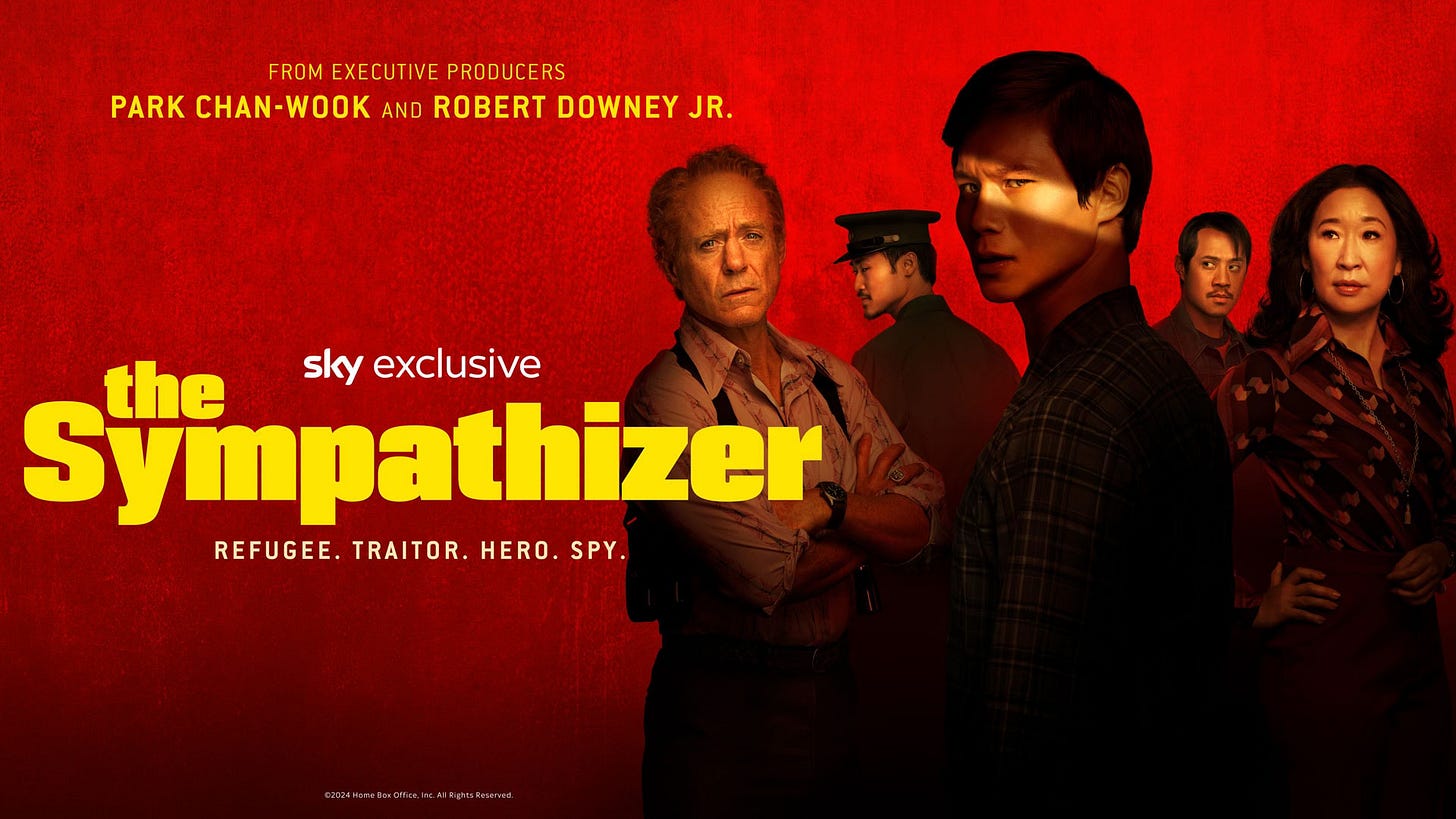
Most know that Viet Thanh Nguyen’s The Sympathizer won the Pulitzer and was adapted into an HBO series. And that Ocean Vuong’s books On Earth We're Briefly Gorgeous and The Emperor of Gladness; as well as Nguyễn Phan Quế Mai’s The Mountain Sings and Dust Child are best seller novels.
Less known may be that Kim Thúy with Ru and André Dao with Anam have won top literary awards in Canada and Australia respectively. Thi Bui’s graphic memoir The Best We Could Do is taught in U.S. universities; Line Papin’s The Girl Before Her is taught in French highschools; and that Abbigail Nguyen Rosewood’s Constellation of Eve was reviewed in The New York Times not very long ago.
Also, Caroline Huynh’s The Fortunes of Jaded Women is currently being adapted for television. Poets like Hoa Nguyen in Canada with A Thousand Times You Lose Your Treasure and Diana Khoi Nguyen in the U.S. with Root Fractures are garnering also much deserving recognition. The success of Viet Thanh Nguyen and Minnie Phan’s Simone, and Thai Nguyen, Monique Truong and Dung Ho’s Mai’s Áo Dài are encouraging writers to do more children's books.
Not too many readers understand that writers like Monique Truong with The Sweetest Fruits and Amy Quan Barry with When I’m Gone, Look for me in the East for instance, purposely resisted expectations to center Vietnam in their work, to show that diasporic literature is not one story, but a spectrum of voices redefining representation.
Unseen Histories
‘It seems to me’, reflects one of the writers in The Cleaving, ‘as if Vietnamese American writers are getting angrier’. Is this part of a more assertive, generational shift in Trump’s America?
Isabelle Pelaud
While one writer in The Cleaving suggests that Vietnamese American writers are getting angrier, I would say that they are becoming more confident and assertive.
Fifty years after the end of the Vietnam War, and with growing recognition, many writers now feel safer to speak their truths—boldly and without apology. This shift is supported by organisations like DVAN (that made The Cleaving possible) as it provides platforms, mentorship, and collective resources to resist tokenism and foster community.
Rather than competing in isolation for limited visibility, writers are uplifting one another, creating space for diverse voices to thrive. In Trump’s America, where racism and xenophobia are resurging, this work is not just necessary—it’s urgent.
The anger some may sense is part of a generational refusal to remain silent, a reclaiming of narrative power that once felt out of reach. These writers are not just responding to the moment—they are helping to reshape it.
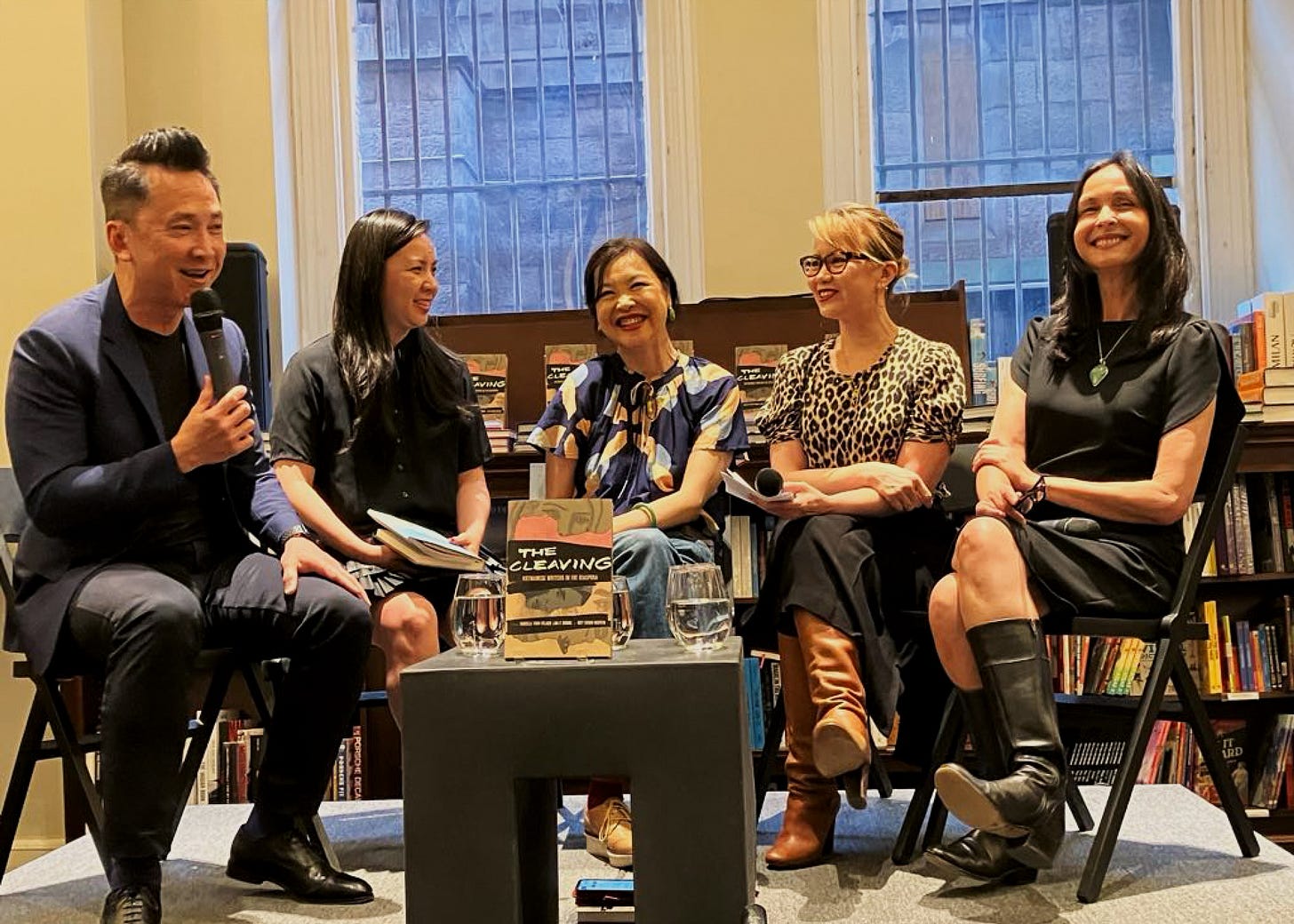
Unseen Histories
While the Vietnamese experience is singular, many of the themes that you engage with in The Cleaving – loss, separation - will resonate widely. The number of migrants is rising steeply. Did the process of compiling The Cleaving teach you anything about the importance of keeping ‘one’s past’ as people embark on their new lives?
Isabelle Pelaud
Compiling The Cleaving reminded us that for many refugees—unlike immigrants—the past is not something left behind, but something carried forward, often with pain, because displacement was not a choice but something that was forced upon them.
Revisiting the past, either privately or publicly, often becomes essential to healing and self-understanding. We were also reminded of how cultural and institutional racism in the U.S. has encouraged those from my generations to distance themselves from our roots, a form of internalised erasure.
But earlier Asian American activists and scholars, university programs such as Ethnic Studies and community organisations have affirmed the importance of remembering for more than fifty years. As a result, young people today are more likely to reclaim their histories as part of asserting that Asian Americans are, indeed, Americans.
What this book of dialogues between writers from six countries also taught us is that identity politics alone is not enough. The diasporic Vietnamese experience—which as I've said it earlier, is marked by colonisation, war, displacement, and racism—is part of a larger global imperialist pattern.
To honor our past and forge meaningful futures, we must embrace solidarity with other refugees of color worldwide •
This interview was originally published June 13, 2025.
Isabelle Thuy Pelaud is a professor in Asian American Studies at San Francisco State University.
She wrote the very first book on Vietnamese American literature titled This Is All I Choose To Tell: History and Hybridity in Vietnamese American Literature and co-edited the award winning book Troubling Borders: An Anthology of Art and Literature by Southeast Asian Women in the Diaspora.
After growing up in France, she moved to the United States where she earned her doctorate from UC Berkeley and spent her career identifying the unique barriers facing Vietnamese American writers prior and after writing a book.
Her academic work has been featured in The Cambridge History of Asian American Literature, Themes in Contemporary North American Fiction, Journal of Asian American Studies, The Asian American Literary Review, Amerasia Journal, and Michigan Quarterly Review.
She is now working on her creative writing.
Unseen Histories relies on your patronage to operate. You can support us by purchasing a book via the links, from which we will receive a small commission. Thank you for your support.
The Cleaving: Vietnamese Writers in the Diaspora
University of California Press, 15 April, 2025
RRP: £21 | ISBN: 978-0520410350
The first and only book to gather the voices and perspectives of Vietnamese diasporic authors from across the globe.
Edited by Isabelle Thuy Pelaud, Lan P. Duong, and Pulitzer Prize–winning author Viet Thanh Nguyen, The Cleaving brings together Vietnamese artists and writers from around the world in conversation about their craft and how their work has been shaped and received by mainstream culture and their own communities. This collection highlights how Vietnamese diasporic writers speak about having been cleaved―a condition in which they have been separated from, yet still hew to, the country that they have left behind.
Composed of eighteen dialogues among thirty-seven writers from France, Indonesia, Kyrgyzstan, Canada, Australia, Israel, and the United States, the book expands on the many lives that Vietnamese writers inhabit. The dialogues touch on family history, legacies of colonialism and militarism, and the writers' own artistic and literary achievements. Taken together, these conversations insist on a deeper reckoning with the conditions of displacement.
With thanks to Sophie Portas.
You can read all our interviews, here.
Subscribe to Unseen Histories for the very best new history books, read author interviews and long-form pieces by the world’s leading historians.


